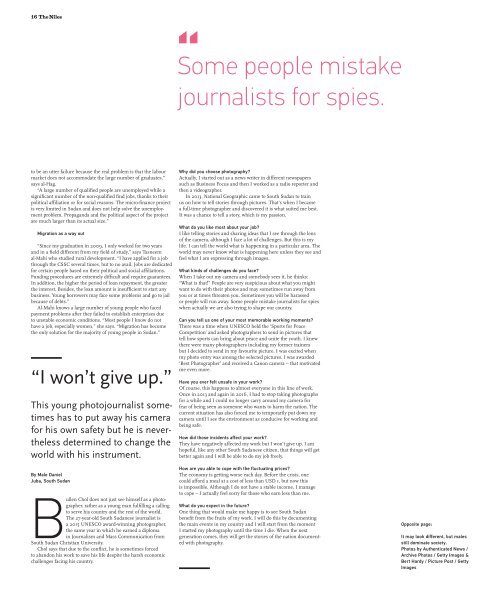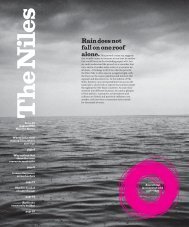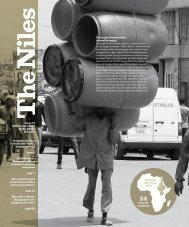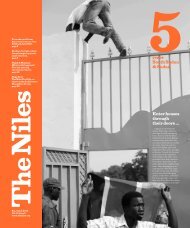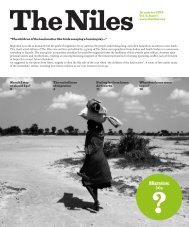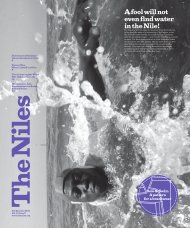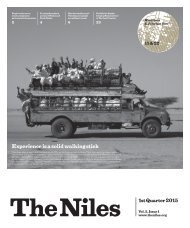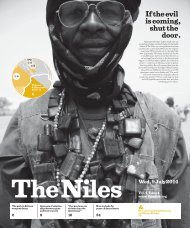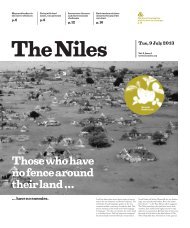Nobody has been sent to see...
Around 50 million people live in Sudan and South Sudan. They marry, they have children, they work – like the fisherwoman in this picture – they live in peace and they wage war against one another. But what awaits them in the future? Is it really as the Nuer proverb suggests, that no one knows what tomorrow brings? Some conflicts, experienced by both countries in the past years, were expected, some predictions could be drawn from past statistics. Correspondents from The Niles portrayed people from both countries through all stages of life and have briefly touched upon what it means to be Sudanese or South Sudanese.
Around 50 million people live in Sudan and South Sudan. They marry, they have children, they work – like the fisherwoman in this picture – they live in peace and they wage war against one another. But what awaits them in the future? Is it really as the Nuer proverb suggests, that no one knows what tomorrow brings? Some conflicts, experienced by both countries in the past years, were expected, some predictions could be drawn from past statistics. Correspondents from The Niles portrayed people from both countries through all stages of life and have briefly touched upon what it means to be Sudanese or South Sudanese.
Create successful ePaper yourself
Turn your PDF publications into a flip-book with our unique Google optimized e-Paper software.
16 The Niles<br />
Some people mistake<br />
journalists for spies.<br />
<strong>to</strong> be an utter failure because the real problem is that the labour<br />
market does not accommodate the large number of graduates,”<br />
says al-Hag.<br />
“A large number of qualified people are unemployed while a<br />
significant number of the non-qualified find jobs, thanks <strong>to</strong> their<br />
political affiliation or for social reasons. The micro-finance project<br />
is very limited in Sudan and does not help solve the unemployment<br />
problem. Propaganda and the political aspect of the project<br />
are much larger than its actual size.”<br />
Migration as a way out<br />
“Since my graduation in 2009, I only worked for two years<br />
and in a field different from my field of study,” says Tasneem<br />
al-Mahi who studied rural development. “I have applied for a job<br />
through the CSSC several times, but <strong>to</strong> no avail. Jobs are dedicated<br />
for certain people based on their political and social affiliations.<br />
Funding procedures are extremely difficult and require guarantees.<br />
In addition, the higher the period of loan repayment, the greater<br />
the interest. Besides, the loan amount is insufficient <strong>to</strong> start any<br />
business. Young borrowers may face some problems and go <strong>to</strong> jail<br />
because of debts.”<br />
Al-Mahi knows a large number of young people who faced<br />
payment problems after they failed <strong>to</strong> establish enterprises due<br />
<strong>to</strong> unstable economic conditions. “Most people I know do not<br />
have a job, especially women,” she says. “Migration <strong>has</strong> become<br />
the only solution for the majority of young people in Sudan.”<br />
“I won’t give up.”<br />
This young pho<strong>to</strong>journalist sometimes<br />
<strong>has</strong> <strong>to</strong> put away his camera<br />
for his own safety but he is nevertheless<br />
determined <strong>to</strong> change the<br />
world with his instrument.<br />
By Male Daniel<br />
Juba, South Sudan<br />
Bullen Chol does not just <strong>see</strong> himself as a pho<strong>to</strong>grapher,<br />
rather as a young man fulfilling a calling<br />
<strong>to</strong> serve his country and the rest of the world.<br />
The 27-year-old South Sudanese journalist is<br />
a 2015 UNESCO award-winning pho<strong>to</strong>grapher,<br />
the same year in which he earned a diploma<br />
in Journalism and Mass Communication from<br />
South Sudan Christian University.<br />
Chol says that due <strong>to</strong> the conflict, he is sometimes forced<br />
<strong>to</strong> abandon his work <strong>to</strong> save his life despite the harsh economic<br />
challenges facing his country.<br />
Why did you choose pho<strong>to</strong>graphy?<br />
Actually, I started out as a news writer in different newspapers<br />
such as Business Focus and then I worked as a radio reporter and<br />
then a videographer.<br />
In 2013, National Geographic came <strong>to</strong> South Sudan <strong>to</strong> train<br />
us on how <strong>to</strong> tell s<strong>to</strong>ries through pictures. That’s when I became<br />
a full-time pho<strong>to</strong>grapher and discovered it is what suited me best.<br />
It was a chance <strong>to</strong> tell a s<strong>to</strong>ry, which is my passion.<br />
What do you like most about your job?<br />
I like telling s<strong>to</strong>ries and sharing ideas that I <strong>see</strong> through the lens<br />
of the camera, although I face a lot of challenges. But this is my<br />
life. I can tell the world what is happening in a particular area. The<br />
world may never know what is happening here unless they <strong>see</strong> and<br />
feel what I am expressing through images.<br />
What kinds of challenges do you face?<br />
When I take out my camera and somebody <strong>see</strong>s it, he thinks:<br />
“What is that!” People are very suspicious about what you might<br />
want <strong>to</strong> do with their pho<strong>to</strong>s and may sometimes run away from<br />
you or at times threaten you. Sometimes you will be harassed<br />
or people will run away. Some people mistake journalists for spies<br />
when actually we are also trying <strong>to</strong> shape our country.<br />
Can you tell us one of your most memorable working moments?<br />
There was a time when UNESCO held the ‘Sports for Peace<br />
Competition’ and asked pho<strong>to</strong>graphers <strong>to</strong> send in pictures that<br />
tell how sports can bring about peace and unite the youth. I knew<br />
there were many pho<strong>to</strong>graphers including my former trainers<br />
but I decided <strong>to</strong> send in my favourite picture. I was excited when<br />
my pho<strong>to</strong> entry was among the selected pictures. I was awarded<br />
‘Best Pho<strong>to</strong>grapher’ and received a Canon camera – that motivated<br />
me even more.<br />
Have you ever felt unsafe in your work?<br />
Of course, this happens <strong>to</strong> almost everyone in this line of work.<br />
Once in 2013 and again in 2016, I had <strong>to</strong> s<strong>to</strong>p taking pho<strong>to</strong>graphs<br />
for a while and I could no longer carry around my camera for<br />
fear of being <strong>see</strong>n as someone who wants <strong>to</strong> harm the nation. The<br />
current situation <strong>has</strong> also forced me <strong>to</strong> temporarily put down my<br />
camera until I <strong>see</strong> the environment as conducive for working and<br />
being safe.<br />
How did those incidents affect your work?<br />
They have negatively affected my work but I won’t give up. I am<br />
hopeful, like any other South Sudanese citizen, that things will get<br />
better again and I will be able <strong>to</strong> do my job freely.<br />
How are you able <strong>to</strong> cope with the fluctuating prices?<br />
The economy is getting worse each day. Before the crisis, one<br />
could afford a meal at a cost of less than USD 1, but now this<br />
is impossible. Although I do not have a stable income, I manage<br />
<strong>to</strong> cope – I actually feel sorry for those who earn less than me.<br />
What do you expect in the future?<br />
One thing that would make me happy is <strong>to</strong> <strong>see</strong> South Sudan<br />
benefit from the fruits of my work. I will do this by documenting<br />
the main events in my country and I will start from the moment<br />
I started my pho<strong>to</strong>graphy until the time I die. When the next<br />
generation comes, they will get the s<strong>to</strong>ries of the nation documented<br />
with pho<strong>to</strong>graphy.<br />
Opposite page:<br />
It may look different, but males<br />
still dominate society.<br />
Pho<strong>to</strong>s by Authenticated News /<br />
Archive Pho<strong>to</strong>s / Getty Images &<br />
Bert Hardy / Picture Post / Getty<br />
Images<br />
tn9_20161207_cc2014.indd 16 2016/12/7 11:29


